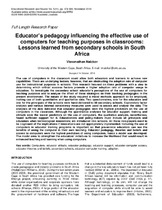| dc.contributor.author | Naicker, Visvanathan | |
| dc.date.accessioned | 2016-06-13T14:47:08Z | |
| dc.date.available | 2016-06-13T14:47:08Z | |
| dc.date.issued | 2010 | |
| dc.identifier.citation | Naicker, V. (2010). Educator's pedagogy influencing the effective use of computers for teaching purposes in classrooms: Lessons learned from secondary schools in South Africa. Educational Research and Review, 5(11): 674-689 | en_US |
| dc.identifier.issn | 1990-3839 | |
| dc.identifier.uri | http://hdl.handle.net/10566/2316 | |
| dc.description.abstract | The use of computers in the classroom could allow both educators and learners to achieve new
capabilities. There are underlying factors, however, that are obstructing the adoption rate of computer
use for instructional purposes in schools. This research focused on these problems with a view to
determining which critical success factors promote a higher adoption rate of computer usage in
education. To investigate the secondary school educator's perceptions of the use of computers for
teaching purposes and to analyse the effect of these strategies on their teaching pedagogies in the
present environment. The nature of the study required a mixed methods approach to be employed,
making use of both quantitative and qualitative data. Two questionnaires, one for the educators and
one for the principals of the schools were hand-delivered to 60 secondary schools. Exploratory factor
analysis and various internal consistency measures were used to assess and analyse the data. The
analyses of the data indicated that educator pedagogies were the highest predictors on the use of
computers in the classroom. Although the quantitative analyses for educator support, training and
attitude were the lowest predictors on the use of computers, the qualitative analysis, nevertheless,
found sufficient support for it. Educationists and policy-makers must include all principals and
educators when technological innovations are introduced into schools. All these role-players need to
be cognisant of the implications if innovations are not appropriately implemented. Including the use of
computers in educator training programs is important so that pre-service educators can see the
benefits of using the computer in their own teaching. Educator pedagogy, theories and beliefs and
access to computers were the highest predictors of using computers, hence a model was developed.
The model aims to strengthen the educators' initiatives to increase the likelihood that would result in
enhanced teaching and learning when using computers. | en_US |
| dc.language.iso | en | en_US |
| dc.publisher | Academic Journals | en_US |
| dc.rights.uri | Academic Journals strongly supports the Open Access initiative. Abstracts and full texts of all articles published by Academic Journals are freely accessible to everyone immediately after publication. | |
| dc.subject | Computers | en_US |
| dc.subject | Educator attitude | en_US |
| dc.subject | Educator pedagogy | en_US |
| dc.subject | Educator support | en_US |
| dc.subject | Educator-computer access | en_US |
| dc.subject | Educator theories and beliefs | en_US |
| dc.subject | Secondary schools | en_US |
| dc.subject | Educator-computer training | en_US |
| dc.subject | Education | en_US |
| dc.subject | South Africa | en_US |
| dc.title | Educator's pedagogy influencing the effective use of
computers for teaching purposes in classrooms:
Lessons learned from secondary schools in South
Africa | en_US |
| dc.type | Article | en_US |
| dc.privacy.showsubmitter | FALSE | |
| dc.status.ispeerreviewed | TRUE | |

